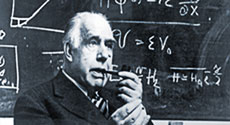Niels Bohr Lecture by Suvi Gezari, Space Telescope Science Institute and Johns Hopkins University
Black Holes Snacking on Stars
Abstract: Supermassive black holes are mysterious and powerful phenomena of extreme gravity that lurk in the centers of almost all galaxies, including our own Milky Way. We cannot detect light directly from a black hole: its gravitational pull is so strong in its vicinity that even light cannot escape it, the region known as the event horizon of a black hole.
However, astronomers have made exciting advances in our ability to study supermassive black holes indirectly, either from witnessing the gravitational pull on stars and gas nearby the black hole, or by observing light emitted by stars and gas in the process of being swallowed by the black hole.
In the near future, we will be able to detect merging binary supermassive black hole systems via gravitational waves, providing a new window into massive black hole evolution over cosmic time.
In my talk, I will highlight how we hunt for supermassive black holes by watching them snack on unlucky stars that wander too close-by in the nucleus of a galaxy. I will show the bounty from our hunt using telescopes on the ground and in space that survey the dynamic night sky, and how we plan to use these star-feeding events to probe the demographics of supermassive black holes in galaxy nuclei, and to answer the fundamental question of how they first formed in the early Universe.
Biography:
Dr. Gezari is an Associate Astronomer with tenure, and the Chair of the Science Staff at the Space Telescope Science Institute in Baltimore, MD and a Research Professor in the Department of Physics and Astronomy at Johns Hopkins University.
Before arriving at the institute, Dr. Gezari was an Associate Professor of Astronomy with tenure at the University of Maryland and the co-director of the Joint Space Sciences Institute.
She was awarded the Kavli Foundation Prize Plenary Lecture at the 235th AAS Meeting in Honolulu, HI in January 2020 for her global leadership in the study of tidal disruption events, received the University of Maryland College CMNS Board of Visitor’s Junior Faculty Award in 2016, was a Scialog Time Domain Astronomy Fellow in 2015, and received an NSF CAREER Award in 2015. Prior to her faculty position she was a Hubble Fellow at Johns Hopkins University.
- She received her bachelor’s of science degree in Math-Physics, with honors at Brown University in 1999.
- Dr. Gezari’s research program harnesses the power of time domain observations to study supermassive black holes.
- Dr. Gezari is a pioneer in observational studies of tidal disruption events (TDEs), luminous outbursts from the nuclei of galaxies that occur when an unlucky star is ripped apart and consumed by a central massive black hole.
- She has used wide-field time domain surveys to discover TDEs, including GALEX, Pan-STARRS1, iPTF, ZTF, and soon with Rubin, Roman, ULTRASAT and UVEX.
Dr. Gezari uses follow-up observations across the electromagnetic spectrum, especially in the UV and X-rays, and spectroscopic observations of their host galaxies, to classify and characterize the events, and use them as probes of accretion physics and massive black hole demographics.
 Niels Bohr Lectures er en engelsk-sproget foredragsrække på Niels Bohr Institutet med kendte forskere fra hele verden.
Niels Bohr Lectures er en engelsk-sproget foredragsrække på Niels Bohr Institutet med kendte forskere fra hele verden.
Foredragene holdes cirka 10 gange om året og er offentlige. De er for studerende og ansatte ved Niels Bohr Institutet samt andre med interesse for at høre om videnskabelig forskning i verdensklasse. Foredragene holdes på et ikke-teknisk niveau, hvor de kan forstås af alle med en baggrundsviden, der svarer til de første år på fysikstudiet.
Tidspunkt og sted: Hvis intet andet er anført, finder foredragene sted kl. 15.15 i Margrethe Bohr Salen, Niels Bohr Bygningen, 2200 København N. Kaffe og kage serveres en halv time inden foredraget starter.
The lectures are public and held about 10 times a year. The lectures are for students and staff at the Niels Bohr Institute and others interested in worldwide scientific research. The lectures are held on a non-technical level where they can be understood by anyone with a background similar to the first year of physics study.
Time and place: Unless otherwise specified, the lectures take place at. 15.15 in Margrethe Bohr Salen, Niels Bohr Bygningen, 2200 Copenhagen N. Coffee and cake will be served half an hour before the lecture starts.
